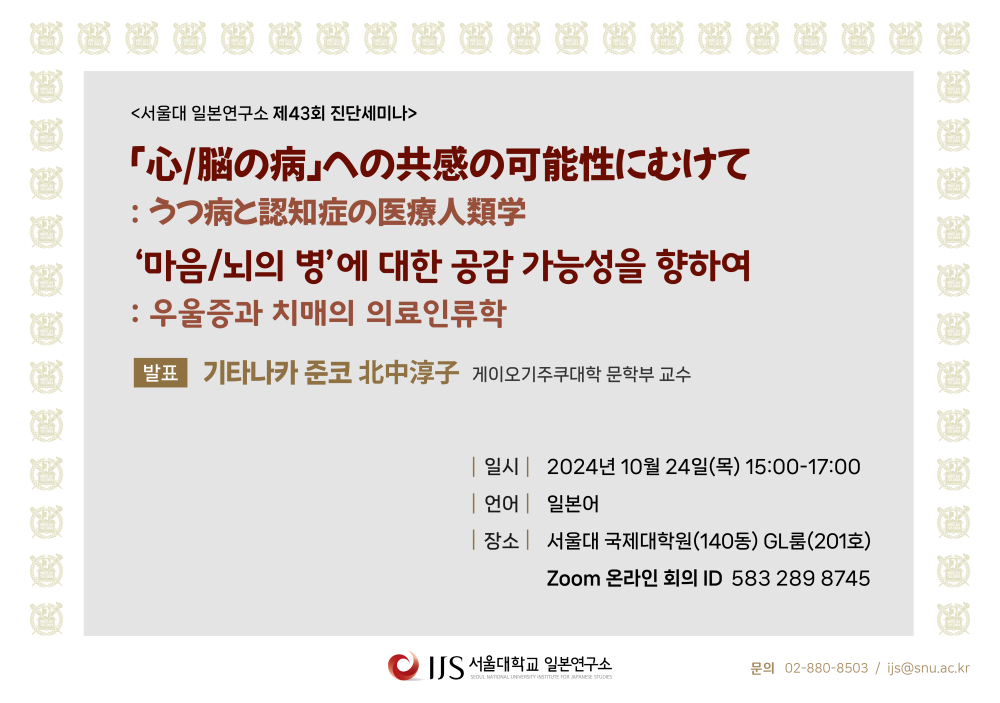
< No.43 SNU-IJS Japan Diagnosis Seminar >
Title: "Towards the Possibility of Empathy for 'Mental/Brain Illnesses': A Medical Anthropology of Depression and Dementia"
(「心/脳の病」への共感の可能性にむけて:うつ病と認知症の医療人類学)
Presenter: Junko Kitanaka, Professor, Department of Human Sciences at Keio University
Language : Japanese
Date: October 24, 2024 (Thursday), 15:00-17:00
Location: SNU GSIS (Building 140), GL Room
-ZOOM ID: 583 289 8745
-ZOOM Link : https://snu-ac-kr.zoom.us/j/5832898745
This seminar will be conducted both online and offline, and anyone can participate without prior registration.
In Japan, where depression was long considered rare, the illness seemed to become a national epidemic after 1998, when the suicide rate exceeded 30,000 for 14 consecutive years and a new generation of antidepressants was introduced. The number of workers taking sick leave due to depression increased, and workplaces began conducting annual stress checks as part of depression and suicide prevention efforts. As a result, awareness of mental health has reached unprecedented levels.
Moreover, people who were once described as simply "a little forgetful" are now being diagnosed with "dementia," and there is a rapidly growing number of elderly individuals engaging in "brain training" to prevent cognitive decline. Many middle-aged and older adults, after receiving MRI scans as part of workplace health exams and being told of brain "shrinkage," rush to memory clinics in a panic.
In Japan, there is an ongoing process of "medicalization" covering the latter half of life. "Medicalization" refers to the phenomenon where issues that were once considered part of life's suffering (birth, aging, illness, death) or moral challenges (madness, drinking, sexual deviance) are redefined as pathologies and become subjects for medical intervention.
This presentation will explore from a medical anthropological perspective how the medicalization of depression and aging has taken place in Japan, what kind of understanding it brings when life's experiences are reinterpreted through the lens of mental health care, and what forms of "empathy" this allows for.
Bio of the Presenter:
Junko Kitanaka is a professor of medical anthropology in the Department of Human Sciences at Keio University in Tokyo, Japan. Kitanaka has been awarded five awards, mainly for her work on depression with the book titled Depression in Japan: psychiatric cures for a society in distress (2012, Princeton University Press), including the prestigious American Anthropological Association’s Francis Hsu Prize in 2013. The book has been translated into French, Japanese, Persian and Korean (and parts of it in Chinese). She has been featured in global media including New York Times, The New Yorker, and BBC, CNN, and Danish, German, and French national TV. She is a member of Japan’s Science Council and has served on numerous journal editorial boards including BioSocieties, Medical Anthropology Quarterly, and Cultural Anthropology and is an associate editor for Transcultural Psychiatry. She is also part of the editorial team for Case Studies in Global Social Medicine to be featured in the Lancet. Her articles include: “The social in psychiatries,” with Ecks, S. and Wu. H. Lancet, 28 May 2021; “Depression.” Cambridge Encyclopedia of Anthropology, with S. Ecks. 2021, and “Depression as a Problem of Labor,” Sadness or Depression?, J. Wakefield & S. Demazeux eds. Springer, 2016. Her work on dementia, preventive psychiatry, and the neuropsychiatrization of the lifecycle has appeared as “In the Mind of Dementia,” Medical Anthropology Quarterly, 34(1), 2020, which has been translated into Spanish.